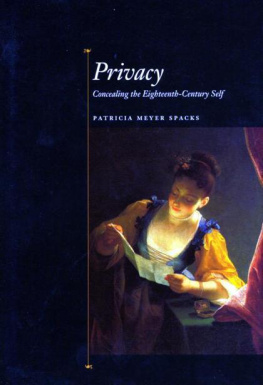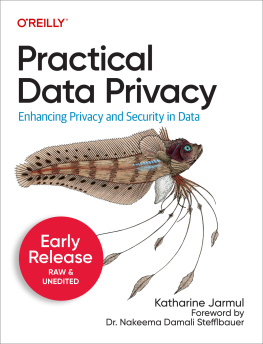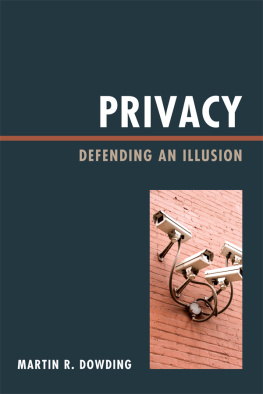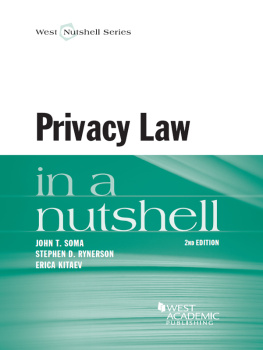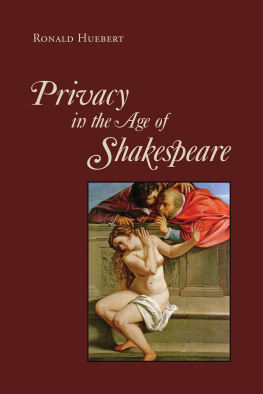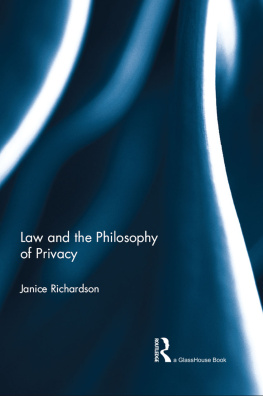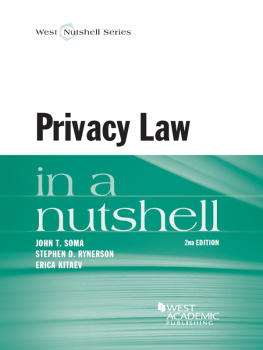Privacy
Privacy
Concealing the Eighteenth-Century Self
PATRICIA MEYER SPACKS
The University of Chicago Press Chicago and London
Patricia Meyer Spacks is the Edgar E Shannon Professor of English at the University of Virginia. She is the author of eleven books, including Desire and Truth: Functions of Plot in Eighteenth-Century English Novels and Boredom: The Liteietry History ofa State ofMind, both published by the University of Chicago Press.
The University of Chicago Press, Chicago 60637 The University of Chicago Press, Ltd., London 2003 by'I'hc University of Chicago
All rights reserved. Published 2003 Printed in the United States ofAinerica
Iz II 10 09 o8 07 o6 05 04 03
I z 3 4 5
ISBN: o-226-76860-0 (cloth)
Library of Congress Cataloging-in-Publication Data Spacks, Patricia Ann Meyer.
Privacy : concealing the eighteenth-century self/ Patricia Meyer Spacks. P. cut.
Includes bibliographical references (p. ) and index. ISBN: 0-2 2 6-76860-0 (cloth : alk. paper) I. English liction-i 8th century-History and criticism. 2. Privacy in
literature. 3. Secrecy in literature. 4. Self in literature. I. Title.
PR858.P72 s67 2003 823'509353-dc2I
2002152993
O The paper used in this publication meets the minimum requirements of the American National Standard for Information Sciences-Permanence ofPaper for printed Library Materials, ANSI z39.48-1992.
Contents
Acknowledgments
One of the pleasures of writing a book is talking with others as the manuscript takes shape. As always, I have profited greatly from conversation. Those whose reactions, insights, and comments proved especially valuable include Myra Jehlen, Deborah Kaplan, William Kates, Jerome McGann, Steven Marcus, Adrienne Munich, Bruce Redford, Margery Sabin, and Aubrey Williams, as well as many graduate students with whom I have worked at the University of Virginia. I feel particular gratitude to those who have read and commented on portions of the manuscript at various stages of its development: Deborah Kaplan, Steven Marcus, Adrienne Munich, and Margery Sabin. I am also indebted to the American Academy of Arts and Sciences, which provided me with a splendid working environment during my semester as a Visiting Fellow in the Humanities.
A section of chapter 4 appeared in "Privacy, Dissimulation, and Propriety: Frances Burney and Jane Austen," in Eighteenth-Century Fiction 12, no. 4 (2000): 515-31.
I
The opposition between public and private, in most formulations, involves a distinction between large and limited arenas-between domestic and national politics, for example, or between the domestic and the civic. The competition thus implied, however, tells us little about privacy, which typically concerns the personal rather than the domestic. Indeed, privacy can ally itself with the "public" side of the public/private dichotomy by its frequent opposition to the domestic: the housewife wants privacy specifically to get away from her family for a time, and from her family responsibilities. Her very capacity to imagine "privacy" depends partly on social class. If significant public functioning, except as a problem for others, seldom belongs to the bottom classes, their lives, though "private," rarely enable physical privacy.
At the beginning of the twenty-first century, privacy figures almost obsessively in the media and inhabits an important place in national consciousness. My favorite symptom: I've noticed recently that in upscale hotels the tags that you put on your door to keep the maid from bothering you no longer read "Do Not Disturb." Instead, they say "Privacy Please." Condensing the force of a negative imperative into a single powerful noun that needs no verb, the new phrase suggests repudiation, rejection of other people, a Greta Garbo stance: I want to be alone. It eliminates the idea of disturbance, some local and limited interference with serenity or pleasure, only to indicate more categorical exclusion of everyone and everything outside the door. The nominally more polite formulation ("Please") in fact conveys greater insistence and a more determined will to be left alone. "Do Not Disturb" hints a desire for noninterference with some specific activity (sleeping, going through papers) for some limited space of time. "Privacy Please" imparts a wish for fundamental separation.
The word privacy, by way of its adjectival form, derives from a Latin word meaning deprived: specifically, deprived of public office; in other words, cut off from the full and appropriate functioning of a man. What originally designated a state of deprivation, however, has come, in the Western middle-class world, to refer to a condition alleged by some in the United States to be a constitutional right, a privileged condition of freedom and control. Indeed, one commentator differentiates privacy from "alienation, loneliness, ostracism, and isolation" precisely on the basis of its self-evident desirability: "alienation is suffered, loneliness is dreaded, ostracism and isolation are borne with resignation or panic, while privacy is sought after" (Weinstein 88).
The catalogue of the Harvard University libraries provides 1,384 entries under the heading "Privacy." An enormous preponderance of thementries 75 through 1,384-cluster beneath the rubric "Privacy, Right of," a rubric mainly subdivided geographically: "Privacy, Right of-Lichtenstein," "Privacy, Right of-Manitoba." What our forebears considered a danger, we assume as our due; those signs on the door demand something that we feel entitled to. That fact in itself suggests our distance from an earlier ideal of communal responsibility and support.
Yet the situation is more complicated than this single piece of data might suggest. I hardly need mention the enormous contradictions that attend current attitudes toward privacy, or the wide range of issues now evoked by the concept. Journalistic media stimulate anxiety about the possibility that Internet circulation of data may damage our privacy. We reject past customs of housing extended families under a single roof in favor of nuclear families, detached dwellings, a separate bedroom for every child. The richer we are, the more likely we are to seek walled enclaves for our homes and secluded Caribbean beaches for our vacations. In other words, we want our privacy. On the other hand, a man who used to work for a newsmagazine told me that people yearn so deeply to appear on television-to have attention paid to them-that if you stick a microphone at them just after they've lost a child, they eagerly talk into it. A large audience appears to exist for twenty-four-hour-a-day filming of random individuals' intimate lives. We watch Oprah and Geraldo, we share our sexual problems with pop psychologists on the radio, we consider a television appearance on Good Morning America a mark of success.
That we, of course, is slippery. I myself don't watch Oprah, and neither do a lot of other people, although millions do. I have refused opportunities to appear on television. I've never set foot on a Caribbean beach, I find walled enclaves distasteful, and I am not unique. Butifwe can designate the culture at large, my sketch indeed suggests a set of contradictions that we all inhabit in one way or another. Social class presumably makes a difference in our specific attitudes as well as our possibilities for possessing privacy, and so do the values of our families and our communities-which is to say we all have our own assemblages of contradictions. Each of us establishes individual boundaries of privacy; each of us may willingly, even happily abandon privacy in different specific contexts. In practice, then, privacy carries in modern Western culture no fixed assignment of value. Sometimes we want the state it designates, sometimes we don't.

